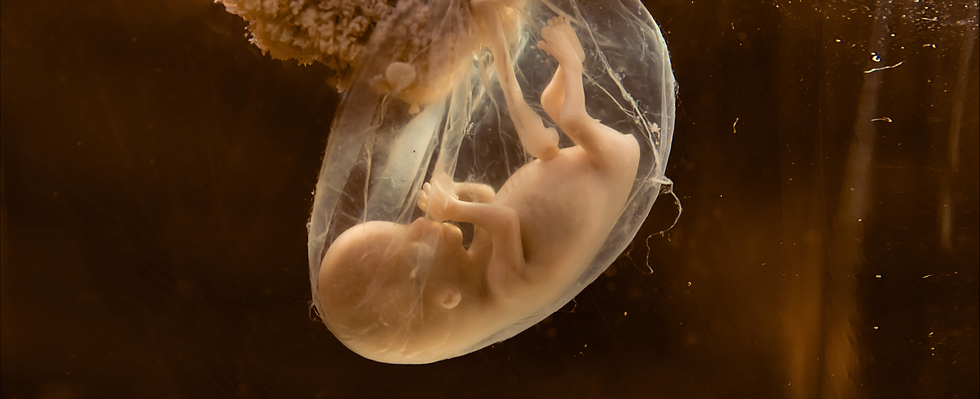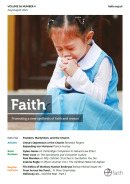The Ethics of Monkey-Human Embryos
Bishop Michael Nazir-Ali looks at a major ethical issue.
Some weeks ago, there was a shocking story in the newspapers about scientists creating a human-monkey embryo and allowing it to survive for some twenty days. The news reports all said that there were huge ethical implications in this development, but none went on to discuss what these were!
I was the Chair of the Ethics and Law Committee of the Human Fertilisation and Embryology Authority for a number of years and these moral issues were being presented to us all the time because of developments in the sciences. Moral reflection was always lagging behind and ‘catching up’ on what went on in the laboratory.
On the one hand, the Human Fertilisation and Embryology Act (HFE Act) itself, and the regulatory rules that flow from it, recognise the special status of the human embryo or foetus. On the other, they allow for experimentation on such an embryo for a period of up to fourteen days, or when the ‘primitive streak’ appears, whichever comes first. The alleged significance of the latter term is that this is the latest stage at which twinning can occur after which, and if it occurs, we are certainly dealing with two individuals. As John Ling, however, in his Bioethical Issues points out, this the latest stage at which twinning can occur, but not the earliest. According to him, this can occur on day one or two of fertilisation! The limit then seems to be arbitrary and to provide a cut off point to satisfy public opinion that there was no untrammelled licence for embryonic research.
Opinion
The prevailing opinion since the Warnock Report in assisted fertility circles seems to be that embryonic and foetal development is continuous and that no one stage is more significant than another. This makes the identification of fourteen days (or the primitive streak) as a cut-off point
for embryonic research as indeed arbitrary, and perhaps neglectful of the precautionary principle that there may be a person at an earlier stage. Because the limit is arbitrary, there is now pressure from some scientists to extend it. Once again, we can ask how far such extensions might go.
The justification usually given for research on embryos, after which they are ‘disaggregated’ or left to perish, is that ‘stem cells’ obtained from human embryos can be programmed to provide ‘miracle’ cures for a host of degenerative diseases.
Moral reflection on scientific possibilities is simply not keeping pace with what is happening in the laboratories.
It is also justified by claiming that embryonic research helps in the treatment of infertility. As far as the latter is concerned, surely our energies should be directed at human gametes, i.e. sperm and eggs, and the organic processes for producing them? No controversy would arise here as no one claims that such material is a person. Where the former justification is given, in fact, the use of adult stem cells derived from bone marrow, umbilical cord blood, etc. can be and are used to provide treatments for illnesses like leukaemia. The Japanese scientist, Shinya Yamanaka, has shown, moreover, that ordinary adult skin cells, for example, can be reprogrammed to become ‘pluripotent’ and thus usable in treating some degenerative disorders.
Bolder
Yet still the industry of research on embryos not only goes on but becomes bolder, and trespasses on more and more hither to prohibited areas. If the ‘slippery slope’ argument is anywhere to be demonstrated, this area of research is surely it. The pursuit of scientific knowledge is certainly a most worthy aim. From the Christian point of view, it is made possible by the correspondence between the rationality of our own minds and the predictability and order of the universe.
As the early Fathers saw, such a correspondence is itself made possible by the Logos, or the Eternal Word of God, who has become incarnate in Jesus of Nazareth (John 1:1- 18). Like any other human pursuit, however, the work of scientists can also be attended by hubris and by a disregard of the means used to achieve desirable ends. Just because it is possible to do something, does not necessarily mean it should be done. Moral reflection on scientific possibilities is simply not keeping pace with what is happening in the laboratories. Society and the Church have to find ways of making sure there is due diligence before possibility turns to practice.
Problematic
One, particularly problematic feature of embryonic research has been the deliberate creation of human-animal hybrids. This can be done in one of two ways: the nucleus of an animal egg is removed and replaced with the nucleus of a human cell. It is to be noted that the mitochondrial material of the animal egg remains. With some electrical wizardry, the human and animal material are fused to result in an embryo which can then be used for experimentation up to the limits as discussed above. Such embryos are known as cybrids because it is only the cytoplasmic material of the animal egg which is used. There are, however, also ‘true hybrids’
which are created by mixing human and animal sperm and eggs. It seems that the human-monkey embryos mentioned in the news reports were true hybrids. The reason most often given for creating these potential monsters is that animal eggs are more easily available than human ones and, in the case of cybrids, much of the material is human and so the research can be closely related to the interests of human medical research. Interestingly, the reason given by scientists involved in the creation of the human-monkey embryo was that it could help in creating hybrid species, from non-primatial animals, which could be used for the harvesting of organs, thus meeting the endemic shortage of organs for transplantation!
Moral and medical questions
If creating human embryos solely for experimenting on them sends shivers down your spine, what do human-animal hybrids do to you and, worse, monkey-human ones? Although there are strong disavowals from the scientists involved, there is the possibility that, one day, someone will implant these embryos in a human or animal or make them come to term in some other way. Frankenstein is no longer a fantasy. What is a human-monkey hybrid? Is it human or animal and who decides?
As to the possibility of using hybrid creatures for spare parts, xenotransplantation itself raises a whole host of moral and medical questions: what will be the quality of life for such creatures brought into being solely to be the means to human ends? For their organs to be usable, they will have to be raised and to live in a sterile environment throughout their lives. Is this compatible with the animal welfare which is an aspect of human stewardship of creation (Gen1:27-31, 2:15)?
Human organs
During the Coronavirus pandemic, we have become increasingly conscious of the dangers of cross-species infection. Even with all the precautions in the world, can we be sure that, in the course of transplantation, we will not cause viruses and other organisms to break through the species barrier? The transplanting of organs has, undoubtedly, saved many lives, but this has involved sacrifice by those donating organs, either their own or of recently, and sometimes tragically, deceased loved ones. To my mind, the processes involved in preserving and harvesting organs makes transplantation a strictly intermediate technology until better ways are found and developed for saving
Behind the culture of embryonic research lies a kind of utilitarian worldview which justifies benefits for some humans at the cost of others who are weak and voiceless by denying their humanity. human lives. One such could be the reprogramming of adult stem cells or somatic cells to grow human organs. Such a method will not require the loss of human or animal life or the costly sacrifice of the live donation of an organ, like a kidney, for a loved one. There is also and always the possibility of producing, at least some, human organs synthetically. Should research efforts and funds not be directed into these potentially fruitful areas rather than on experimentation on human or hybrid embryos?
Behind the culture of embryonic research lies a kind of utilitarian worldview which justifies benefits for some humans at the cost of others who are weak and voiceless by denying their humanity. In spite of evidence, there is no acknowledgement as to when there is a person or even a prudential use of the precautionary principle to treat the human embryo, at every stage, as if there was a person.
Christian tradition
Some moralists, relying on the Greek Septuagint translation of the Hebrew Bible at Exodus 21:22 and its interpretation by some Fathers, such as St. Augustine, and scholastics, like St. Thomas Aquinas, have attempted to make a distinction between the ‘formed’ and ‘unformed’ foetus. Thus, while they would be opposed to any experimentation and destruction of the formed foetus, they would accept that this might be possible with the unformed foetus. Such a position is not dissimilar to the fourteen-day limit set by the HFE Act. Against this, it needs pointing out that both the Bible and the Fathers regard the destruction of any embryo or foetus as morally culpable, even if some did not think that the destruction of the early embryo was homicide. Secondly, the Aristotelian distinction between the ‘ensouled’ or ‘vivified’ and the ‘unformed’ embryo, although it has parallels in modern embryology with the establishing of the nerve net and the beginning of brain activity, cannot continue to be held in the light of our knowledge about the processes of fertilisation and implantation in the womb. We know now that the complete genetic makeup of the embryo is present from fertilisation. It is true that there are important stages in its development such as implantation, sentience, mobility and, of course, birth, but it would be hazardous to claim that personhood was linked to any one of these and did not exist before a particular stage. If we had to choose between the Warnock Report’s alternatives of the embryo being ‘a potential person’ or ‘a person with potential’, we should choose the latter.
Science has its own independence and society should not needlessly interfere in its work, except where there is the possibility of harm to persons, the family or society. In judging when this may happen, we need to have a view of personhood, family and society that is not simply determined by the shifting sands of public opinion but is based on concrete evidence, natural law and the ways in which the Judaeo-Christian tradition has articulated and taught these in the light of biblical revelation as brought to us by the Apostolic teaching of the Church.
Bishop Michael Nazir-Ali is Anglican Bishop Emeritus of Rochester.






